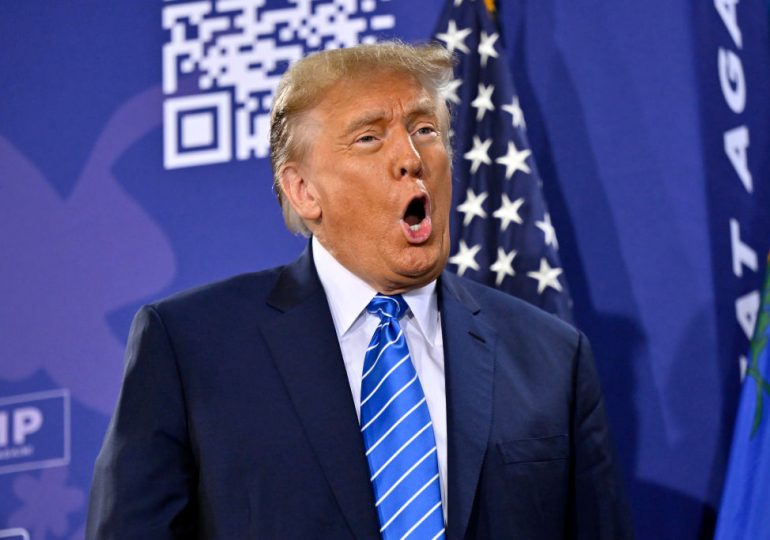As we head into 2024 with Donald Trump as the all but confirmed Republican nominee, any hope that Trump and his rampant lying—seemingly about anything and everything—might retreat into history has clearly become wishful thinking. Mendacity is back in town. The political ground, hardly stable over the past three years, has started to wobble once more. Facts, hardly in surplus in today’s political culture, are busily transforming themselves into opinions before our eyes. Many of us—including those in Trump’s own party—feel exhausted by our own indignation.
[time-brightcove not-tgx=”true”]
Back in 2020, when Trump launched his most audacious lie yet about his “stolen election” many commentators cited Hannah Arendt, evoking her idea of the audacious big lie to warn of how close America was getting to political meltdown. This time round, perhaps, rather than reaching to Arendt for a pithy soundbite or indignant tweet, we might want to read her more attentively. Arendt—the twentieth-century’s most dogged debunker of totalitarian fictions—gave clear warning that outrage alone would not be enough to stop lying in politics.
She had been interested in how the most outrageous lies get a political hold ever since Nazi lies about the Jews, Communists, and intellectuals drove her from Berlin in 1933 after her arrest by the Gestapo. She wrote her final analysis of the nature of the modern political lying after the publication of the Pentagon Papers revealed the extent to which American lawmakers and bureaucrats had carefully, patiently, painstakingly constructed a fiction about the Vietnam War—a fiction fit enough for other people’s children to die in.
Lying in politics is not new, Arendt counseled. The habits of totalitarian thinking persist long after totalitarian regimes have fallen. And she had a message for us today. “When we talk about lying,” she wrote, “let us remember that the lie did not creep into politics by some accident of human sinfulness; moral outrage, for this reason alone, is not likely to make it disappear.” Yelling “but he’s lying” is not going to make him stop. In fact, as we now know, outrage actually feeds the machine that drives the creation of a defactualized politics. Our outrage at the lies is harvested to create an atmosphere in which it precisely feelings—not facts—that count.
Still, it’s hard to give up being outraged when the lies are so outrageous. Little lies are corrosive, but mega lies work to cut loose from any pretense at facts. The out-of-this-world nature of these lies is the point. They are not so much political, as anti-political because they suggest epic fights that are somehow beyond the human world—such as the idea of presidents being anointed by God, or by his phantom surrogate in America ‘the people’.
There is a kind of madness here. Arendt described the “active, aggressive capability”to believe in lies (as compared to passive gullibility) that distinguishes modern political lying. Lies like this are grandly shameless, blatantly, and obviously fake. Political lying isn’t even lying anymore. We know that you know we are lying, say the politicians, but isn’t that part of the thrill? Tell us the world is made up of more than the mundane fact we are forced to live by, reply many, and yes, of course we will believe you. Anything is better than this.
“The modern political lies deal efficiently with things that are not secrets at all but are known to practically everybody,” Arendt wrote. People are not duped. They are positively keen for deceit. The lies work because their authors know that in today’s political culture it is not simply the case that people do not know what to believe, but rather that believing in anything with any degree of sincerity or authenticity has become all but impossible. To believe in the incredible and outrageous has become a kind of pseudo-action—a last lunatic lunge for political belonging.
The cartoon outlandishness of this may well feel new. But Arendt would also point out that this is merely latest chapter in the long history of politics and lying. Part of the theater of political life lies in the artistry with which politicians can conjure up an image of a world. To this extent, facts are always prey to the manipulation of opinion. And it’s here, that we need to be cautious and slow down a little.
Some lies seek to take us out of politics altogether, but otherwise fiction-making is part of what politics is—indeed has to be. “Factual truths are never compellingly true,” Arendt says. “Facts need testimony to be remembered and trustworthy witnesses to be established … no factual statement can ever beyond doubt—a secure and shielded against attack as, for instance, the statement that two and two make four.”
We live in a world of contingent facts, which is absolutely not to say that all facts are relative and up for grabs. It means that the world is complex, shifting, sometimes random, perplexing and bewildering. Politicians have always known that this means the best stories are likely to be those that make some sense of reality. The real question is what kind of story stays true to our actual existence together, and what kind produces tyranny?
Reason is not enough here. Indeed, like outrage, reason might be part of the problem in a defactualized world. “Lies are often much more plausible, more appealing to reason, than reality, since the liar has the great advantage of knowing beforehand what the audience wishes or expects to hear. He has prepared his story for public consumption with a careful eye to making it credible.” Some lies appeal not because they are illogical, but precisely because of their logic. Indeed, for Arendt it is a feature of totalitarian ideologies that their driving logic trumps reality: you can’t think A without thinking B (You can’t wish for an end to unaccountable power without signing up to the extermination of the Jews; you can’t wish equal wealth distribution without the consenting to the death of the bourgeoise, etc…). It is not reason, but reality that finally disrupts the liar.
But how bad does reality has to get before the myths are finally punctured? Wars with the potential of a worldwide conflagration are already being fought. The earth is scorched, the fires are burning, the levies are being breached. “Conceptually, we may call truth what we cannot change,” Arendt wrote “metaphorically it is the ground on which we stand and the sky that stretches above us.” In the end, the condition of the earth we stand on cannot be a matter of mere opinion.
We must render unto politics the sort of lying it needs to do its work and it should be possible to do this without a fatal collapse into cynicism, mendacity, or nihilism. Because facts do not stand by themselves, we must fight for the kind of storytelling that can make facts appeal to people who do indeed have different opinions. The political storytellers we need the most right now are those who are most skilled at persuading us to share a world of facts.
There was a further problem with America’s big lie in the 1970s for Arendt. The lies manufactured by public relations teams and policy wonks in Washington were so effective domestically because they rested on an image of America that many found all too plausible. Indeed, one that they believed passionately and were prepared to keep believing despite immediate and compelling evidence to the contrary. All political lies are also contingent truths, otherwise they wouldn’t (usually) have a hope of getting a toehold on the public imagination. The image that the Pentagon lied in order to protect and propagate was one of America as a great and exemplary world power, incorruptible, democratically free, and morally fair. It was a lie that America still lived in. Some would say that it is a lie that America still lives in.
Trump’s outrageous lies are one thing. But what about self-deception? In the realm of politics, Arendt said, perhaps political self-deception is the greatest threat. The self-deceived politician, “loses all contact, not only with his audience but with the real world which will catch up with him”. In another sobering moment, Arendt reflects that perhaps the person who is most likely to be an “an ideal victim of complete manipulation is the President of the United States” themselves. Some Presidents might stake their power on outrageous deceits; but is the President who is deceived about his own beliefs necessarily in the strongest position to win the battle for democracy?
Hannah Arendt, a refugee from the deadliest of European lies Europe loved America, because she thought its political system had the ability to cope with the reality of a pluralistic, flawed, but possible brilliant, community. “Let the chickens come home to roost,” she said in talk given in Boston in May 1975, let America see what it had truly become. “It was the greatness of this Republic to give due account for the sake of freedom to the best in men and to the worst.” If America really still wanted freedom, it had to renounce the fantasy of its own omnipotence. The country needed to reckon with its best and its worst.
Those would be the last lines she would publish in her lifetime when her talk was reprinted in The New York Review of Books in June 1975 under the title “Home to Roost,” a phrase that Malcolm X had first used after John F. Kennedy’s assassination. Before that, Tom Wicker published an account of her talk in The New York Times and her mailbox was immediately flooded with letters requesting a copy of her typescript. One of these came from a young senator named Joe Biden. “As a member of the Foreign Relations Committee of the Senate, I am most interested in receiving a copy of your paper,” he wrote. It is likely that Biden would have eventually read the published version of her talk. It remains an open question as to whether America has yet reckoned with its best and worst.
Adapted from Stonebridge’s new book We Are Free to Charge the World: Hannah Arendt’s Lessons in Love and Disobediance
Leave a comment








